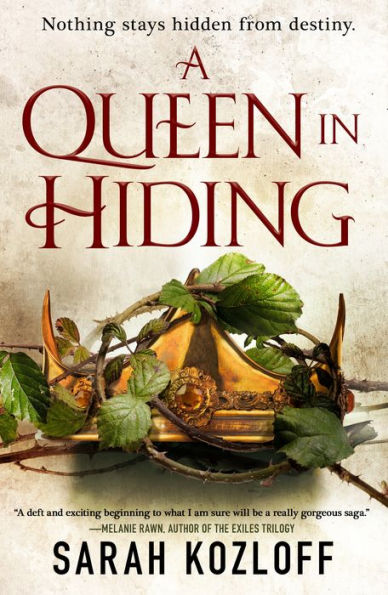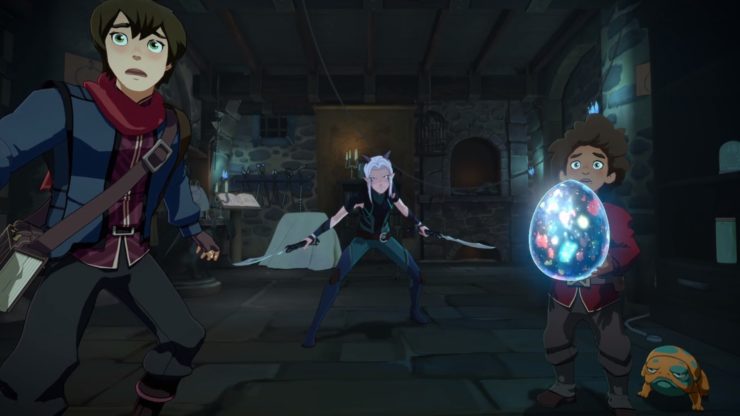Well do I remember my excitement when the HBO adaptation of George R.R. Martin’s A Game of Thrones was first announced. As a dyed-in-the-wool fantasy nerd and a reader of the series from its late ‘90s inception, I thought its translation to the screen was a no-brainer: With Martin’s iconic characters, vivid world, and film-ready dialogue, HBO was handed a cinematic gift on a platter. I went on to defend the show from the initial snobbery with which it was received by critics, most notably by Ginia Bellafante of The New York Times, in a Huffington Post essay that went viral. And for a while there I felt vindicated, as the first couple of seasons of the show did ample justice to the books.
It was sometime in the third season—maybe when Theon Greyjoy was being castrated and tortured for what felt like hours—that I turned to my husband and mused, “You know… I’m not enjoying this.” The castration scene, which is nowhere to be found in the books, was hardly the first of its kind: The showrunners seem to delight in presenting pain and suffering in graphic detail. The gleeful sadism of this particular scene—in which Theon is teased into an eager erection by a couple of temptresses as an unwitting prelude to his castration—was the straw that began to break me. I started to notice that more and more, the showrunners were eschewing Martin’s smart dialogue. I noticed that most scenes between two characters had a tendency to end with either a stabbing or a sex act, with numbing predictability. I noticed showrunner David Benioff’s comment in an interview: “Themes are for eighth grade book reports.” And I sure as hell noticed the choice of the showrunners, independent of George R.R. Martin, to depict the rape of Sansa Stark. I began to realize that for all the sex and torture in HBO’s Game of Thrones, its sensibility was that of a teenage sociopath. It had no maturity and no soul.
The realization was a crushing disappointment. I’m a sucker for everything epic fantasy aspires to do and be; I get chills during the Game of Thrones opening credits—easily the best part of the show—for the sheer intensity and scope they promise. If the show had delivered on that promise, no one would have been more delighted than me. But: “Themes are for eighth grade book reports.” OK, then. Message received.
Some time later, when a friend told me to watch Netflix’s The Dragon Prince, I thought it would be—I don’t know, cute; it’s a kids’ cartoon.
The Dragon Prince begins like a traditional fantasy narrative: a conflict between nations based on past wrongs, some scheming for the throne, and the numinous presence of a magic that can be used for good or ill. The primary protagonists are a couple of young princes, who become embroiled in a plot involving possible war after their father, the king, is murdered by the enemy nation.
Here’s what makes The Dragon Prince a show for kids: There is no sex, no graphic violence, and—so far, at least—nothing too terrible happens to the protagonists. There is an adorable animal companion. Oh, and no one says “fuck.”
Buy the Book


A Queen in Hiding
Yet despite the show’s PG rating, it’s mature as hell. The hallmark of immaturity is a tendency to oversimplify. The Dragon Prince does the opposite with its characters, whose complexity can compete with the characterization of many adult television shows. Maybe it’s the consequence of not having the option to torture people horribly (or shoot nude prostitutes full of arrows—thanks for the memories, Joffrey!), but The Dragon Prince turns this seeming limitation to its advantage: No one is purely evil in this story. The characters that do terrible things contrive to justify themselves in ways that are almost convincing. We’re not talking about the villains of superhero shows who always have a “motive” that usually makes no sense. (How was the Daredevil villain going to “save Hell’s Kitchen” with human trafficking? Just kidding, I don’t want to know.) The people who commit villainous acts in The Dragon Prince contend with genuine inner conflict, and manage to do just as many good deeds to balance the bad to the point that it can all become… confusing, in the best possible way. Just when you think you know what to expect of a character, you’re introduced to a new angle, a new element of backstory.
And a funny thing about themes in stories is this: They don’t exist simply to be unearthed by obedient students for book reports. They’re not the literary equivalent of eating your vegetables. A work that grapples with the hard truths that confront us on a daily basis tends to result in a more complex, unpredictable, emotionally hard-hitting story—because the truths about the world are inherently complex and often there’s no straightforward bromide that solves them. Now, take a fantasy that grapples with real questions, real challenges, and the potential for powerful storytelling is off the hook.
When The Dragon Prince takes on themes of power, identity, political complexity, and relationships, it’s with the accentuated impact of the fantastic. While there’s a pleasurable sense of wonder to exploring the magic as its layers are steadily revealed, magic fulfills a significant thematic purpose. Magic is presented as an unnatural act for humans, involving killing animals and succumbing to dark powers. It functions as a temptation both for the villain and the protagonist, but also a possible means of redemption and self-discovery. And as a series of wrenching scenes in the second season drive home, magic can present deceptively simple solutions to moral dilemmas.
What begins as a simple quest to prevent a war expands over time. We see that the stage for this story is vast; that past events have rendered the present more complicated than we recognized, at first . In that way, it’s like the world we live in. As in our world, it is perilous to forget history, but equally perilous to cling to it too much. As in our world, the people who believe in simple, easy solutions for the world’s ills are not only wrong, but dangerous.
In the second season I was moved to tears more than once by what is ostensibly a children’s TV show. The questions it poses have no easy answers. One clear value runs throughout—that of compassion. The only clear-cut wrong is to do harm to others. Everything else, from war to famine to the decisions of rulers, is presented in shades of grey. Watch to feel deeply, to wrestle with conflicting ideas, and be swept up in enchantment. In other words, watch The Dragon Prince to get the best of what epic fantasy can achieve.
Season 3 of The Dragon Prince premieres November 22nd on Netflix.
Article originally published in April 2019.
Ilana C. Myer has worked as a journalist in Jerusalem and a cultural critic for various publications. As Ilana Teitelbaum she has written book reviews and critical essays for The Globe and Mail, the Los Angeles Review of Books, Salon, and the Huffington Post. Last Song Before Night was her first novel, followed by Fire Dance. She lives in New York. Find her on Twitter @IlanaCT.











A good review that highlights the strength of the show–complex morality–but highlighting this without mentioning the accusations of bullying, creating a hostile environment for women, and gaslighting toward the showrunner Aaron Ehasz feels like major gap given how it ties into everything else in the article.
Great to see someone reviewing this show for what is a wonderful series for kids and adults alike.
” Maybe it’s the consequence of not having the option to torture people horribly”
No, he prefers to rip people’s souls out of their living bodies instead…
Crossing my fingers that we will see more of Xavia.
Not as enthused about Callum learning magic, but let’s see where that goes.
I said this when this article was originally published. I still feel that, while I love this show and think it’s great fun to watch, it can feel very disjointed how the show switches between childish and horrifying. Like a villain ripping someone’s soul from their body followed up with a slapstick quip. A show that I think threads that needle better (and that I think is more deserving of best fantasy show now) is The Dark Crystal. I really like TDP though and I’m looking forward to this next season.
Sexuality and explicit violence are such powerful spices that they dominate whatever narratives they’re used in unless the creators are very, very careful. I have ideological objections to censorship, but it has become clear to me that the old self-imposed content codes had an unanticipated benefit – by preventing creators from taking quick and easy paths, the codes obliged them to create characterization and complexity.
When there are fewer restrictions on sex and violence, it’s easy to use them. It doesn’t take particular skill or craft to get an audience’s attention. And so they come to be used more and more often, to the detriment of the quality and artistic value of the resulting works. It takes a lot of talent to put sex and violence into art and use them well… and not everyone has that level of talent.
I was pleasantly suprised when I started watching this series as I went in with low expectations but found how much I am engaging with these characters and their stories. Certainly more exciting about watching the next season later this year than I was for any of the last few seasons of GoT.
My husband is upset that he can no longer share the delight of discovering a new Star Trek episode with our kids, because it’s no longer “Plug your ears, kids, adult joke incoming,” but is instead a matter of entire episodes being rated R before the credits even roll. And that’s a relatively mild example. He had to make sure that I had something to do on my computer with my headphones on before starting the Battlestar Galactica reboot after the Sexy Torcha episode aired. And he only watched Game of Thrones when nobody else was in the house, in case somebody might get up for a drink of water and see something that would give them nightmares. (He gave up on it, because it was the same stupid bloody rapey thing over and over.)
The Dragon Prince is on our short list of antidotes, not merely because it doesn’t have bloody violence, terror porn, or sex, but because (as you said) it uses its minutes to tell a deeper story than that.
Good show. But….just wait The Legend of Vox Machina comes out!
@1 – Agreed. Although I don’t think that was public knowledge in April when this article was first written.
Well, all I know is that I’m glad for this recommendation…without which, I would never had even tried this show. It has filled a gap wonderfully.